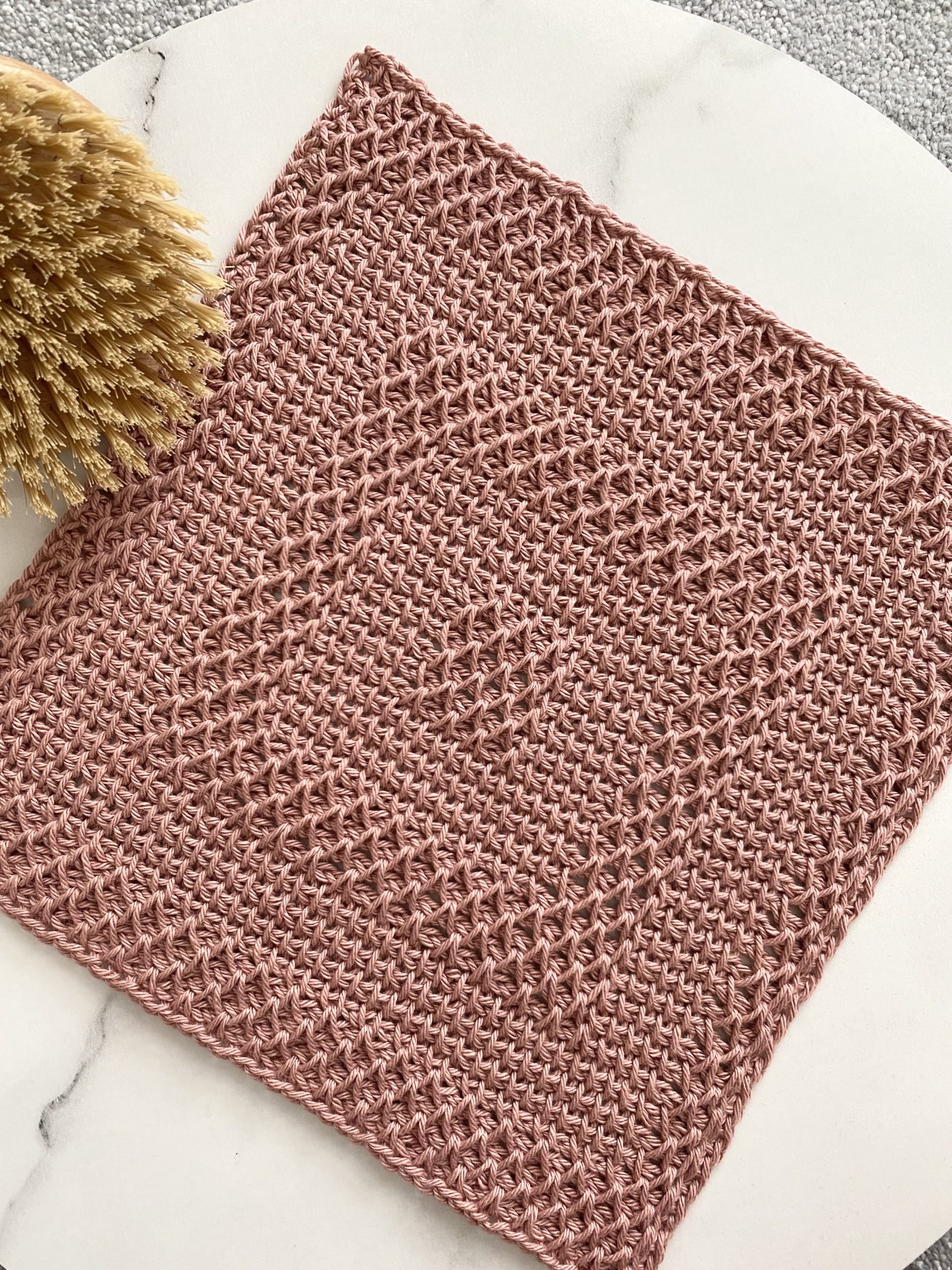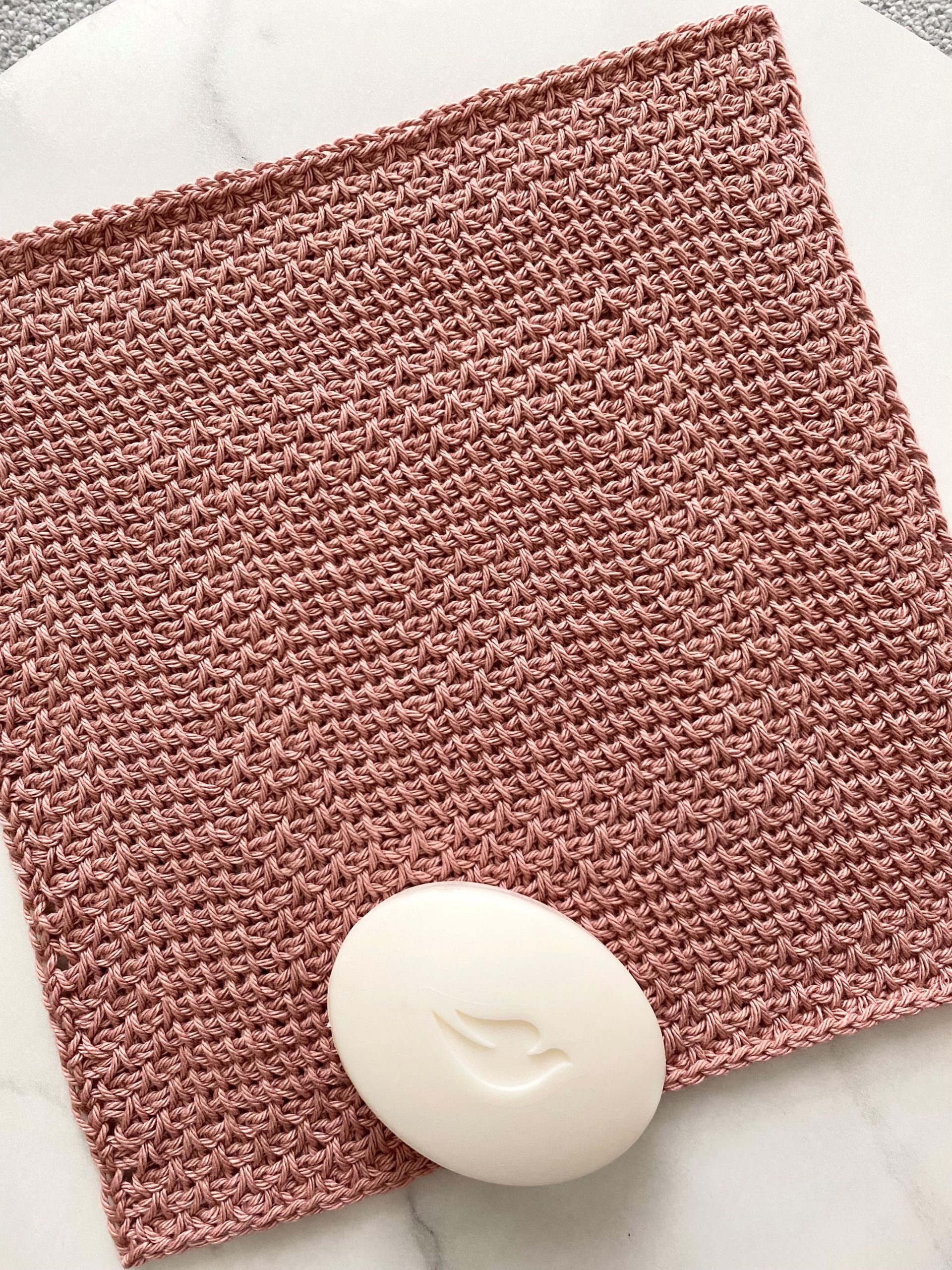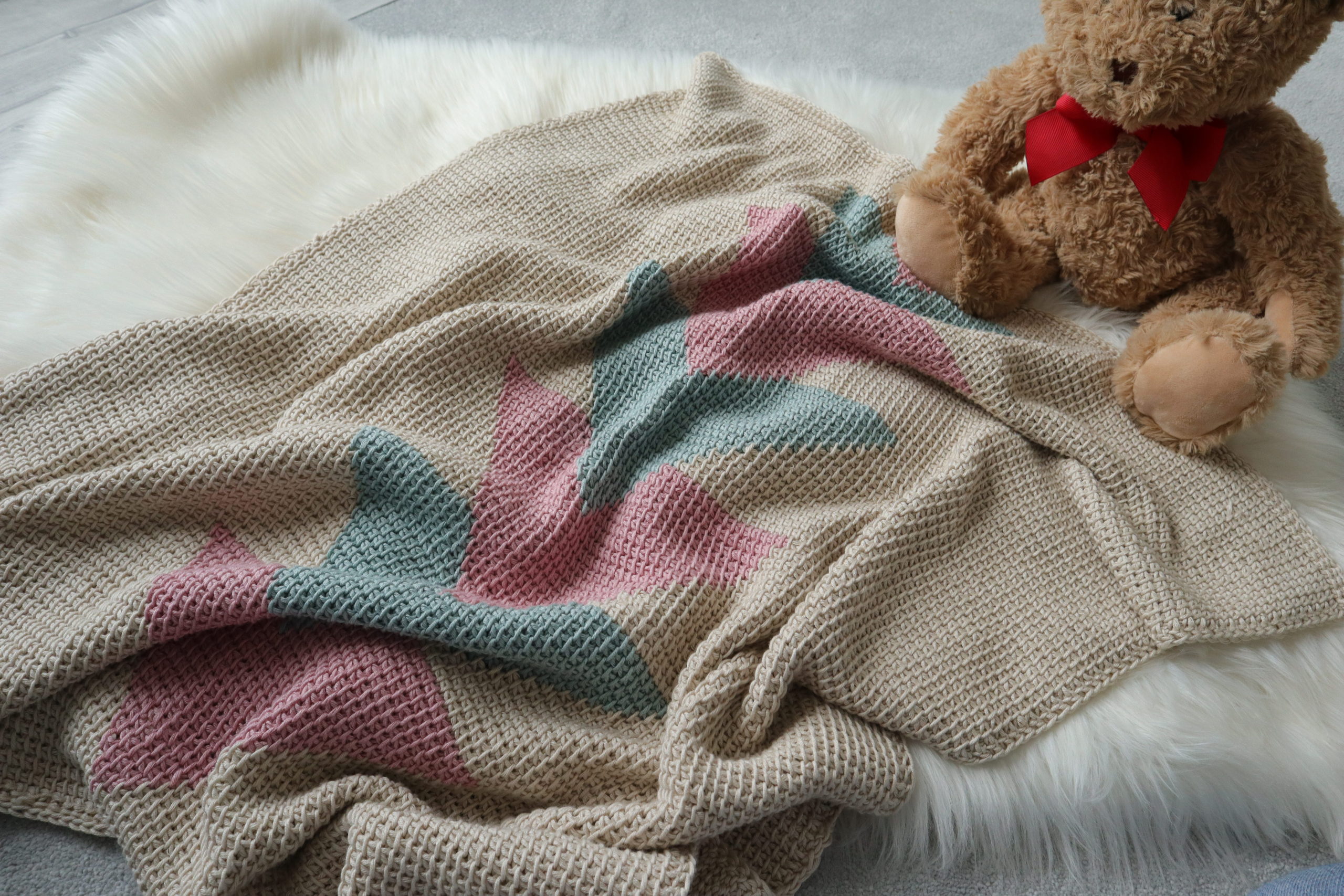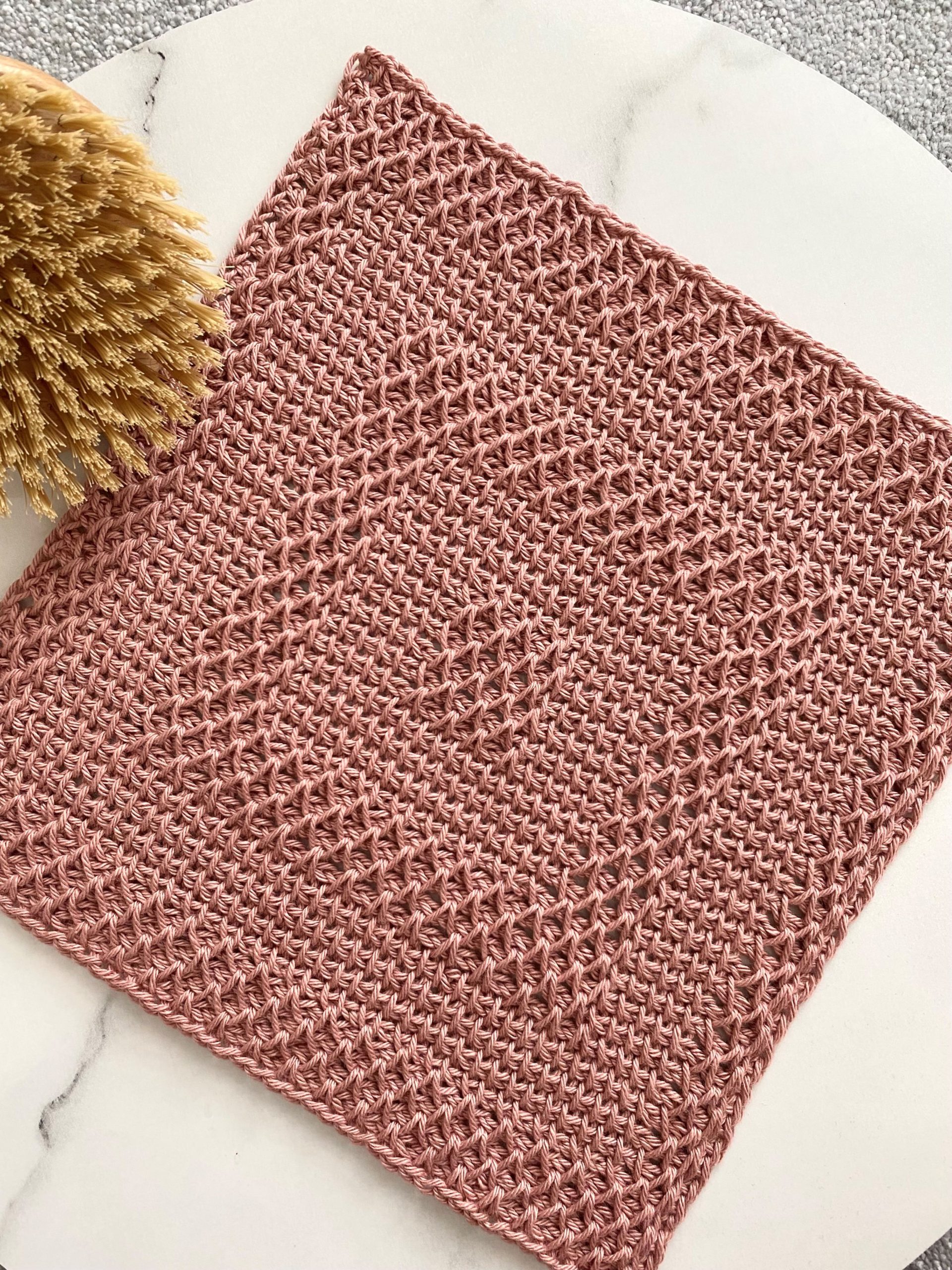The Ela Facecloth Set is a wonderful last-minute gift made using Tunisian crochet. You will learn and master a variety of basic and more complex Tunisian crochet stitches and techniques while making these 4 facecloths.
The first of the four facecloth would make a great introduction to Tunisian crochet; you will learn how to start your project, basic stitches that are worked in the popular Honeycomb stitch combination and how to bind of your project.
You can purchase the add free PDF version of the pattern at LoveCrafts here and Ravelry here.
This site contains affiliate links to products. We may receive a commission for purchases made through these links at no extra cost to you. This helps to cover the running cost of the website and enables me to continue making free patterns.
Please NOTE that this pattern is subject to copyright and is my intellectual property. The online version is for personal use only. Do not re-publish or sell this pattern in part or full or make video tutorials of it. Any such actions are a breach of copyright and can result in legal action.
Here are links to other parts:

Skills required
Chain, Tunisian crochet technique (alternating forward and return passes), Tunisian simple stitch (tss), Tunisian purl stitch (tps), Honeycomb stitch pattern bind-off, blocking.
Skill level

Finished measurements
The final blanket measurements (blocked):
25.5 cm x 25.5 cm (approx. 10 x 10)”
Materials and tools
Stylecraft Naturals Bamboo & Cotton (60% Bamboo, 40% Cotton | DK weight | 100 g (3.5 oz) = 250 m (273 yds)), (#7166) Cameo 2 balls (enough for all 4 facecloths)

Tunisian crochet hook size 4.5 mm (US size 7) with cable (at least 12.5 cm (5”)) or size to obtain the gauge
Tapestry needle
Scissors
You can get your craft supplies here.
Gauge
Blocked Gauge:
18 sts x 16 rows = 10 x 10 cm (4 x 4)” over st pattern (alternated tss and tps)
Gauge helps you to understand how the project turns out in terms of the final size. If you would like to achieve the exact size of the final project as in the instructions above, you gauge needs to match exactly to the above.
If you get more stitches and/or rows than stated above using the exact hook size as per instructions, your final project will turn out smaller. Conversely, if you get less stitches and/or rows than stated above using the exact hooks size as per instructions, your final project will turn out bigger.
To make adjustments, if you get more stitches and/or rows, you can try using bigger hook size to get closer to the desired size. Conversely, if you get less stitches and/or rows, you can try using smaller hook size to get closer to the desired size.
It may take trial and error to try out a few hook sizes to achieve the exact size.
Alternatively, if you really don’t want to make several samples to achieve the desired size, you can try to alter your tension as you work the project. However, I would advise to try this out once you master the basics of Tunisian crochet as it may be a bit tiresome to try to master the basics of Tunisian crochet and focus on alternating your tension while working the project.

Stitch guide
Tunisian crochet stitches are worked in 2 steps; forward and return pass from right to left, with the number of sts (lps) increasing on the hook during the forward pass and decreasing during the return pass.
Return pass is worked in the same way for all stitches (rows of sts) used in this project as follows : 1 ch, * yrh, draw through 2 lps on hook, rep from * until 1 lp on hook.
Edge stitches:
Right edge stitch- This is the first lp on hook and counts as first st unless otherwise stated.
Left edge stitch- This st is referred to in the pattern as the End Stitch (ES) and is crocheted as follows: Rotate the end of the fabric towards yourself, insert the hook under both bars (left and right) of the last st, yrh and pul.
- First row of Tunisian crochet: Insert the hook in the back bump of second ch from hook, yrh and pul across.
- Tunisian simple stitch: Insert the hook from right to left under front vertical bar of the next st, yrh and pul.
- Tunisian purl stitch: Bring yarn to the front on the work and hook, insert the hook from right to left under the front vertical bar of the next st, yrh and pul.
Honeycomb stitch pattern bind-off: *TSS in next st, pull through the lp just made through the lp that is already on hook, 1 lp left on hook, TPS in next st, pull through the lp just made through the lp that is already on hook, 1 lp left on hook; rep from * to last st, ES, pull through the lp just made through the lp that is already on hook, 1 lp left on hook.
| Abbreviations: | |
| ch- chain | yrh- yarn round the hook |
| st(s)- stitch(es) | pul- pull up a loop |
| lp(s)- loop(s) | FP- forward pass |
| tss- Tunisian simple stitch | RP- return pass |
| tps- Tunisian purl stitch | approx.- approximately |
| ES- End stitch | rep- repeat |
| RS- right side |
Notes
The facecloth is worked flat, RS facing from right to left.
Similar light weight yarns may be substituted; please check gauge.
The stitch count refers to the number of lps on hook on FP.
Washcloths or facecloths are ideal projects to learn a new stitches or techniques before fully committing to a large project, such as a garment or a blanket. It allows you to have a quick win- a project finished in a few hours or an evening that can be a great gifting option to for those last moment pressies or stocking fillers. I especially love washcloths for their versatility and the fact that I can whip one without having to shop for more yarn- there is always enough yarn for a washcloth in my stash! 🙂

Instructions
Facecloth
Chain 47.
Row 1 FP: Insert the hook in the back bump of second ch from hook, yrh and pul across. 47 lps on hook.
Row 1 RP and all other RPs: Standard RP.
Row 2: *Tss in next st, tps in next st; rep from * to last 2 sts, tss in next st, ES in next st.
Row 3: *Tps in next st, tss in next st; rep from * to last 2 sts, tps in next st, ES in next st.
Rows 4-5: Rep Rows 2-3.
Row 6: [Tss in next st, tps in next st] twice, tss in each st across to last 5 sts, [tps in next st, tss in next st] twice, ES in next st.
Row 7: [Tps in next st, tss in next st] twice, tss in each st across to last 5 sts, [tss in next st, tps in next st] twice, ES in next st.
Rows 8-9: Rep Rows 6-7.
Row 10: [Tss in next st, tps in next st] twice, tss in next 5 sts, tps in next st, *tss in next st, tps in next st; rep from * to last 10 sts, tss in next 5 sts, [tps in next st, tss in next st] twice, ES in next st.
Row 11: [Tps in next st, tss in next st] twice, tss in next 6 sts, *tps in next st, tss in next st; rep from * to last 10 sts, tss in next 5 sts, [tss in next st, tps in next st] twice, ES in next st.
Rows 12-13: Rep Rows 10-11.
Row 14: [Tss in next st, tps in next st] twice, tss in next 5 sts, tps in next st, [tss in next st, tps in next st] twice, tss in next 17 sts, tps in next st, [tss in next st, tps in next st] twice, tss in next 5 sts, [tps in next st, tss in next st] twice, ES in next st.
Row 15: [Tps in next st, tss in next st] twice, tss in next 6 sts, [tps in next st, tss in next st] twice, tss in next 18 sts, [tps in next st, tss in next st] twice, tss in next 5 sts, [tss in next st, tps in next st] twice, ES in next st.
Rows 16-17: Rep Rows 14-15.
Row 18: [Tss in next st, tps in next st] twice, tss in next 5 sts, tps in next st, [tss in next st, tps in next st] twice, tss in next 5 sts, tps in next st, [tss in next st, tps in next st] three times, tss in next 5 sts, tps in next st, [tss in next st, tps in next st] twice, tss in next 5 sts, [tps in next st, tss in next st] twice, ES in next st.
Row 19: [Tps in next st, tss in next st] twice, tss in next 6 sts, [tps in next st, tss in next st] twice, tss in next 6 sts, [tps in next st, tss in next st] three times, tss in next 6 sts, [tps in next st, tss in next st] twice, tss in next 5 sts, [tss in next st, tps in next st] twice, ES in next st.
Rows 20-23: Rep Rows 18-19.
Rows 24-27: Rep Rows 14-17.
Rows 28-31: Rep Rows 10-13.
Rows 32-35: Rep Rows 6-9.
Rows 36-39: Rep Rows 2-5.
Row 40: Honeycomb stitch pattern bind-off. Fasten-off.
Finishing
Weave in ends and block to final measurements as in schematic.
I would love to see and share your work on social media, use #elafaceclothset or #exquisitecrochetuk.
Pattern support: exquisite.crochet.uk@gmail.com
You can purchase the add free PDF version of the pattern at LoveCrafts here and Ravelry here.
Further resources:
Pattern video tutorial:
For endless crochet inspiration, you can subscribe to AllFreeCrochet website here.
If you prefer to have all your craft inspiration in one place, FaveCrafts is definitely the place to go. Why not subscribe to their newsletter here so you would not miss a thing!
Find the other facecloths from this set here:
Did you enjoy the part 1 of Ela Facecloth Set pattern? Why not try my other small crochet items patterns:

Thank you so much if you got this far in the pattern! I hope you got inspired for your own version using various colours. I can’t wait to see it! Don’t forget to tag me on Instagram and let me know in the comment section below how you got on with it! As always, if you have any pattern query, the quickest way to get it answered is by emailing me on the pattern support email address above.
Happy crocheting!




One thought on “Ela Facecloth Set part 1”
Comments are closed.